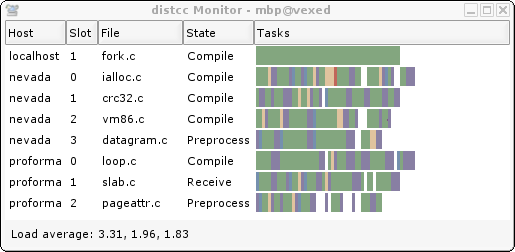
The motto of Sun Microsystems back in the day was “The Network Is The Computer” which might be kind of relevant when CPUs were slower and single-core affairs, but lately to get a faster compile, you’d simply throw more cores and memory at the problem. The thing is, most of us don’t do huge compilations all that often, we can’t remember the last time we even attempted a Linux kernel build. However if you do find yourself with a sudden need to do so, and have access to a pile of machines hooked to a network, then why not check out distcc: the fast distributed C/C++ Compiler? We’ve seen a few mentions in comments and a HaD links article referencing it, but never explicitly covered the tool. So here we go.
To call distcc a compiler is a bit misleading, it is a compiler frontend. Each client you have access to runs the distcc daemon process and sits there awaiting instructions. To start a parallel compile, you invoke your normal build command with the ‘pump’ script, enable parallel build mode set the compiler to ‘distcc’ and let the tool do the rest. A really nice feature is that the compiler hosts need not share a filesystem or have synchronised clocks. They can even be different operating systems and CPU architectures, with appropriate cross-compilers in place, so leveraging existing hardware without dedicating it to the task is much easier.
Distcc compiler support is focussed upon GCC, but does include support LLVM as well. OS support is primarily aimed at Linux but seems to run just fine on various BSD derivatives and even Cygwin on Windows. You can imagine a neat scenario where whilst working on your laptop, you come home and kick off a new build, for your machine to pick up the other machines in your vicinity and automatically tap into their CPU power. And you only need to set it up once!
Whilst this is distributed computing for your needs, on your network, we have seen many good uses lately of distributed computing across the whole internet. Like the one about a certain pesky coronavirus.
- SEO Powered Content & PR Distribution. Get Amplified Today.
- PlatoData.Network Vertical Generative Ai. Empower Yourself. Access Here.
- PlatoAiStream. Web3 Intelligence. Knowledge Amplified. Access Here.
- PlatoESG. Carbon, CleanTech, Energy, Environment, Solar, Waste Management. Access Here.
- PlatoHealth. Biotech and Clinical Trials Intelligence. Access Here.
- Source: https://hackaday.com/2024/03/04/oc-accelerate-your-large-builds-locally-with-distcc/
- :is
- :not
- :where
- $UP
- a
- About
- accelerate
- access
- across
- Affairs
- aimed
- All
- and
- appropriate
- architectures
- article
- AS
- At
- attempted
- automatically
- awaiting
- back
- BE
- Bit
- build
- builds
- but
- call
- CAN
- certain
- check
- client
- Clocks
- come
- comments
- compiler
- computing
- Coronavirus
- covered
- CPU
- day
- Derivatives
- different
- distributed
- distributed computing
- do
- does
- Dont
- each
- easier
- enable
- Even
- existing
- explicitly
- FAST
- faster
- Feature
- few
- Find
- fine
- focussed
- For
- Frontend
- GCC
- get
- Go
- good
- had
- Hardware
- Have
- here
- Home
- hosts
- However
- HTTPS
- huge
- if
- imagine
- in
- include
- instructions
- Internet
- into
- IT
- just
- kick
- Kind
- laptop
- large
- Last
- lately
- let
- leveraging
- like
- links
- linux
- locally
- machine
- Machines
- many
- Memory
- mentions
- might
- misleading
- Mode
- more
- most
- Motto
- much
- Neat
- Need
- needs
- network
- never
- New
- nice
- normal
- of
- off
- often
- on
- only
- operating
- operating systems
- or
- OS
- Other
- out
- Parallel
- pick
- pile
- Place
- plato
- Plato Data Intelligence
- PlatoData
- power
- primarily
- Problem
- process
- really
- referencing
- relevant
- remember
- REST
- Run
- runs
- scenario
- script
- seems
- seen
- set
- Share
- simply
- sits
- slower
- So
- start
- sudden
- Sun
- support
- Systems
- Tap
- Task
- that
- The
- their
- then
- There.
- they
- thing
- this
- throw
- time
- to
- tool
- upon
- us
- uses
- various
- was
- we
- WELL
- were
- when
- which
- Whilst
- whole
- why
- windows
- with
- without
- working
- you
- Your
- yourself
- zephyrnet










